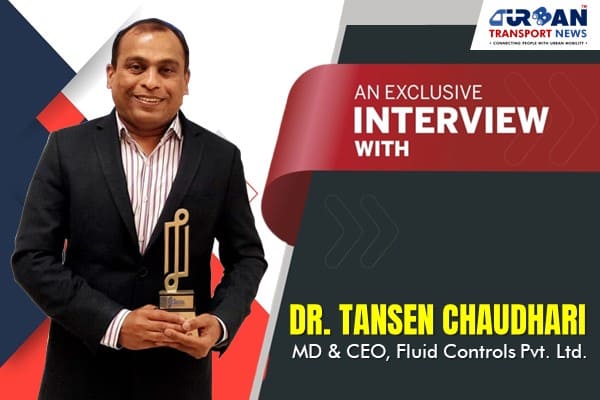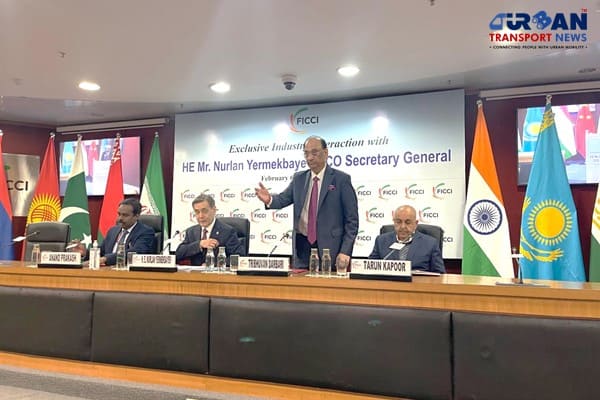 North-South Commuter Railway (NSCR): Modern Train Network Connecting Luzon Island
North-South Commuter Railway (NSCR): Modern Train Network Connecting Luzon Island India launched Bharat Taxi Service as First Cooperative-Owned Digital Mobility Platform
India launched Bharat Taxi Service as First Cooperative-Owned Digital Mobility Platform India places World’s First Live Commercial Order for Hyperloop-Based Cargo Logistics
India places World’s First Live Commercial Order for Hyperloop-Based Cargo Logistics How Weigh-in-Motion Systems Are Revolutionizing Freight Safety
How Weigh-in-Motion Systems Are Revolutionizing Freight Safety Women Powering India’s Electric Mobility Revolution
Women Powering India’s Electric Mobility Revolution Rail Chamber Launched to Strengthen India’s Global Railway Leadership
Rail Chamber Launched to Strengthen India’s Global Railway Leadership Wage and Hour Enforcement Under the Massachusetts Wage Act and Connecticut Labor Standards
Wage and Hour Enforcement Under the Massachusetts Wage Act and Connecticut Labor Standards MRT‑7: Manila’s Northern Metro Lifeline on the Horizon
MRT‑7: Manila’s Northern Metro Lifeline on the Horizon Delhi unveils ambitious Urban Mobility Vision: Luxury Metro Coaches, New Tunnels and Pod Taxi
Delhi unveils ambitious Urban Mobility Vision: Luxury Metro Coaches, New Tunnels and Pod Taxi Qatar approves Saudi Rail Link Agreement, Accelerating Gulf Railway Vision 2030
Qatar approves Saudi Rail Link Agreement, Accelerating Gulf Railway Vision 2030
Exclusive Interview with Dr. Tansen Chaudhari, MD & CEO, Fluid Controls Pvt. Ltd.

Dr. Tansen Chaudhari is presently working in the capacity of Managing Director & Chief Executive Officer at Fluid Controls Private Limited. Dr. Chaudhari has a Ph.D. in Mechanical Engineering from IIT Bombay. He has over 20 years of rich experience in Research and development as well as Enterprise Sales, P&L, and General Management. His experience speaks volumes about his professional expertise. He had a stint in the US at the GE (General Electric) Global Research and Management roles with GE Business. He also has 5 US patents to his credit and has published 20+ papers in international journals.
Besides, he is a Lean Six Sigma Master Black Belt and DFSS Black Belt. Dr. Chaudhari is also a Board-of-Studies member at various Engineering Colleges and Business Schools and is a visiting faculty at many institutes, to name a few Government College of Engineering Pune and Jalgaon, Symbiosis Institute of Business Management (SIBM), Symbiosis Institute of Operations Management (SIOM), and Symbiosis Institute of Technology (SIT), Vishakarma Institute of Information Technology (VIIT).
Under his guidance, Fluid Controls has received several technical and innovation awards, including the CII Industrial Innovation Award for Medium Scale Manufacturing Organization and recognition as one of the top 25 Innovative companies.
As the Managing Director and CEO, what is your vision for the future of Fluid Controls and how do you see the company evolving to meet the changing needs of the Railways & Transportation industry?
Certainly, all of us have witnessed phenomenal changes in recent years in the transportation industry, i.e., especially the railway industry. Since its inception in 1974, Fluid Controls has been committed to its vision to anticipate and address the challenges that customers may face in this crucial industry. Investing substantially in research and development (R&D) speaks volumes about our company's dedication to innovation and providing optimized solutions to meet the changing needs of the railway industry.
Supplier expectations in this sector have evolved significantly, requiring suppliers to not only deliver quality products but also to innovate, adapt, and provide value-added services. And by staying at the forefront of technological advancements through its DSIR-approved in-house R&D center, NABL-accredited testing lab, and state-of-the-art manufacturing facility, Fluid Controls is well-positioned to continue delivering cutting-edge solutions to its global customers, whether it's for Metro, Railway Coaches, or Locomotives. This commitment to innovation and customer satisfaction will undoubtedly ensure Fluid Controls remains a leader in the railway industry for years to come.
Fluid Controls play a vital role in brake piping applications for rail and metro. Can you elaborate on the contributions and innovations that Fluid Controls has introduced in the railways and transportation sector?
Yes, Fluid Controls has been awarded 2 Global/USA patents and 2 India Patents for its major contributions to brake piping research and development offerings in the railway industry. Reliability-Availability-Maintainability-Safety (RAMS) is the key to Fluid Controls’ unique offerings. We have built a strong Research and Development (R&D) team consisting of PhD holders in various areas like metallurgy, reliability, stress analysis, and related areas. We have set up a NABL accredited Testing Facility for all the necessary global requirements of the Rolling Stock, which cover salt spray testing, fatigue testing, impulse testing, etc. Also, we have rolled out a testing app using which customers can remotely start the test and download the results after completion.
Rail systems often face unique engineering challenges. How does Fluid Controls approach developing solutions for these challenges, ensuring safety, efficiency, and reliability in railway applications?
In the railway industry, product performance is a combination of many factors, starting from site installations; to the climatic conditions; to the user's usability and noise factors. Incorporating all these multi-variate expectations into the product design is the key.
Fluid Controls uses the Lean Six Sigma methodology as a systematic tool to incorporate all combinations of these factors. Each of our products undergoes design from the First Principles. We have the latest 3D Modeling software and Finite Element Analysis software. This helps us incorporate all possible factors and analyse them well before even prototyping. The effort put here definitely pays off in terms of the time saved. So, computer-aided engineering analysis, prototyping and testing, and then final production is the sequence Fluid Controls follows for every solution offered. Performance testing to the global standards then makes the product undergo lots of edits. But time and energy spent at this instant is a big saving and because of this process, we ensure zero customer complaints about the supplies.
Being approved by major Indian OEMs, including railway OEMs, highlights a significant accomplishment. How has collaboration with the railway sector contributed to Fluid Controls' growth, and what role does it play in shaping the company's future?
Collaborating with major Indian OEMs, especially railway OEMs, marks a significant milestone for Fluid Controls, demonstrating the company's capability to meet the stringent standards and requirements of the railway industry. This approval not only validates Fluid Controls' expertise and quality but also has contributed immensely to Fluid Controls' growth in several ways.
Fluid Controls understands that the railway industry, like any other, expects integrity in not only the products and solutions offered but also in the way an organisation operates. The regular inputs from the industry expertise are invaluable. The organisations like Fluid Controls greatly benefit from the openness and the technical insights provided whether it is for regular supplies or new product development. Initial conceptual drawings to part development using relevant global engineering standards, then prototyping & testing; on-site fitment; and waiting for the performance of the product is the broad process followed for any product development. No doubt, Fluid Controls’ reciprocation from an engineering investment perspective, i.e., R&D manpower, testing equipment, sourcing specific materials, and then high-precision expert machining, has equally contributed to this growth. I always say that we compete with ourselves, and this has helped us always be ahead of the competition.
Fluid Controls has served international clients in various verticals. Could you share an instance where Fluid Controls' products played a crucial role in enhancing railways, transportation, and engineering systems globally, demonstrating the company's impact on a broader scale?
Let me share one incident here with you. Once, one of our international customer sourcing teams reached out to us with their Typical Product Drawings and Standards. Initially, we provided a product that met their requirements after numerous changes in the design and manufacturing. When we started working closely with this international customer, they introduced us to their Design and Development team there. The reception from this team exceeded our expectations. They explicitly praised Fluid Controls for our expertise in our product offerings, distinguishing us as experts while considering themselves assemblers and final product performance drivers. This led to us offering them tested sub-assemblies which not only led to their vendor consolidation and cost savings but also saved a lot of effort in final fitment. Fluid Controls now enjoys a strong partnership with this customer, collaborating on projects from their inception across continents.
In the context of rail and metro applications, what innovative products or solutions have Fluid Controls introduced to address the evolving needs of these systems?
The simplest example here is the introduction of a new product across frame connectors. Frame Connectors connect the tubes above and below the floor. We suggested total elimination of welding resulting in significant savings by reducing intricate processes. This enabled the customer to adopt best practices, leading to simplification and cost reduction. This particular product does take care of climatic conditions, and connecting dissimilar materials. Apart from this, we also introduced our swaging machine for ferrule connectors which takes care of all sizes and does the initial tightening called Snug tight also. This does prevent the operator from ignorance.
Fluid Controls is recognized for offering end-to-end "Make in India" solutions. How do you envision the role of indigenous replacements in contributing to the growth and self-sufficiency of the nation's railways & transportation sector?
Fluid Controls has been granted 2 Global/USA patents for the case hardening process. Earlier, we used to outsource this process abroad. Like this, our country is coming out with many Make-in-India technologies and offerings as new solutions that are not only cost-effective but also work well for the local environment. With such unique developments, the organizational thought process also goes to the next level which helps business substance. Make-in-India developments also help save time i.e. one gets immediate solution, and the other is the service after fitment i.e. local serviceability is much better and faster too. This end-to-end solution enables vendor consolidation for customers and also reduces the need to check the performance of every component individually. Whereas, sub-assemblies help a lot here.
Looking ahead, what kind of partnerships or collaborations do you envision for Fluid Controls within the rail engineering sector, and how will these contribute to the company's ongoing success?
In today’s local and global village, one cannot do everything alone. Collaboration is the key. Together, one can achieve more—faster and better. Fluid Controls has set up a Centre of Excellence (COE) at VIIT Pune, an engineering institute, for the new test setups. We offer internships and work on joint projects with post-graduate students. Fluid Controls has granted 2 India patents that came out of the collaborations of VIIT Pune. Fluid Controls promotes training and interactions across organizations and educational institutes. In my personal opinion, collaborations often spark innovative thinking, leading to new directions and out-of-the-box solutions.
The railway industry is witnessing rapid technological advancements. How do Fluid Controls stay at the forefront of these changes, ensuring that its products align with the latest innovations in rail engineering?
As you may know, Fluid Controls was founded by Dr. Y. E. Moochhala, who obtained a Ph.D. in mechanical engineering from North Western University, USA. Following his legacy, I am now driving the same technical focus, as I also have a Ph.D. in Mechanical Engineering from IIT Bombay and have worked globally in General Electric’s (GE) R&D center before joining Fluid Controls. In essence, Fluid Controls’ technology base is way ahead of the competition. We follow the Lean Six Sigma methodology for our improvements and new product developments too. We have a Center of Excellence (COE) at VIIT Pune. Every year, we take many interns from various engineering institutes. We participate in global exhibitions and conferences. Our employees are encouraged and supported to pursue higher education. Spending on employee self-development training is our substantial expenditure. We take care of our employees' health through various initiatives. Without mentioning, we spent more than 10–12% of our overall income on R&D. So, in all, it is a commitment to excellence through the “Walk-the-Talk” philosophy. All these things together help us stay ahead of expectations with our innovations.
Is there a personal anecdote or experience that you can share, highlighting your passion and connection to the railways and transportation industry, and how it has shaped your perspective at Fluid Controls?
The railways and transportation industry has taught me a lot in the past 13 years of my career at Fluid Controls. For example, when I was conducting a seminar at one coach factory, one of the attendees asked me a question on the torque application while tightening. This prompted me to work on the solution of a fixed torquing product. So, I keep gathering inputs from all interactions. This helps me shape the offerings and helps shape my organisational objectives as well. In one of the industries, I was asked about sustainability. When I explained to them about commercial sustainability and told them how at Fluid Controls, we have attempted to achieve this, they were surprised. Personally, this industry is of logical reasoners and thoughtful implementers. Yes, in years to come, this industry needs to move to data analysers and innovative Solution offers.






